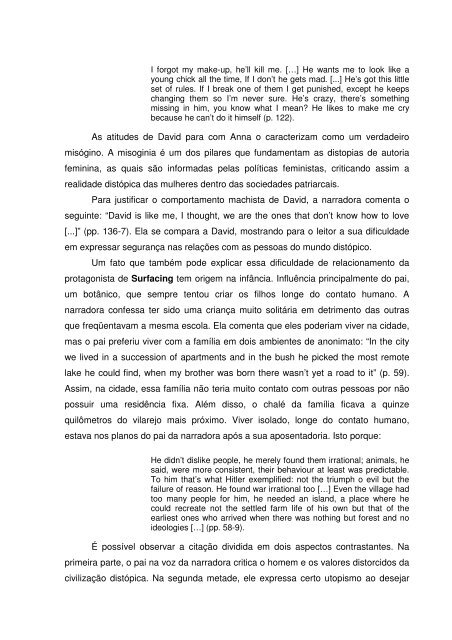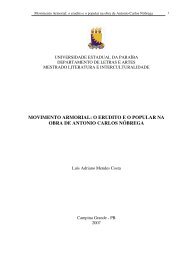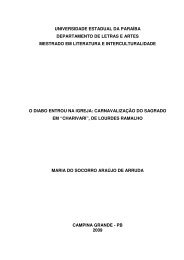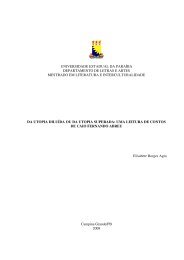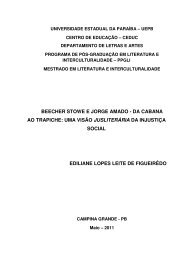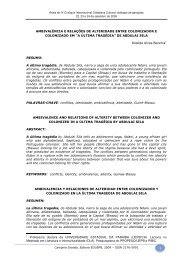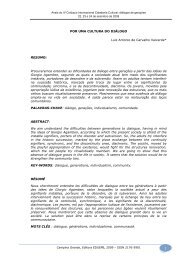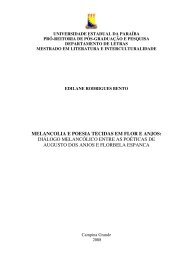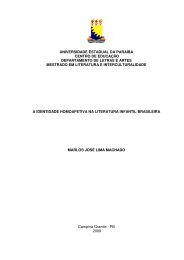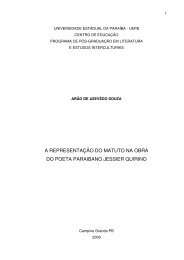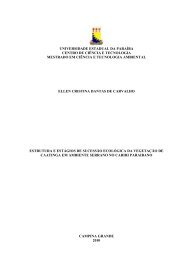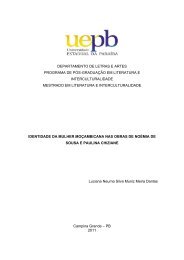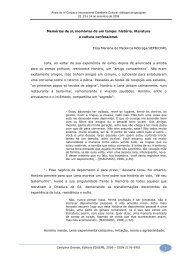Suênio - pos-graduacao - Uepb
Suênio - pos-graduacao - Uepb
Suênio - pos-graduacao - Uepb
Create successful ePaper yourself
Turn your PDF publications into a flip-book with our unique Google optimized e-Paper software.
I forgot my make-up, he’ll kill me. […] He wants me to look like a<br />
young chick all the time, If I don’t he gets mad. [...] He’s got this little<br />
set of rules. If I break one of them I get punished, except he keeps<br />
changing them so I’m never sure. He’s crazy, there’s something<br />
missing in him, you know what I mean? He likes to make me cry<br />
because he can’t do it himself (p. 122).<br />
As atitudes de David para com Anna o caracterizam como um verdadeiro<br />
misógino. A misoginia é um dos pilares que fundamentam as distopias de autoria<br />
feminina, as quais são informadas pelas políticas feministas, criticando assim a<br />
realidade distópica das mulheres dentro das sociedades patriarcais.<br />
Para justificar o comportamento machista de David, a narradora comenta o<br />
seguinte: “David is like me, I thought, we are the ones that don’t know how to love<br />
[...]” (pp. 136-7). Ela se compara a David, mostrando para o leitor a sua dificuldade<br />
em expressar segurança nas relações com as pessoas do mundo distópico.<br />
Um fato que também pode explicar essa dificuldade de relacionamento da<br />
protagonista de Surfacing tem origem na infância. Influência principalmente do pai,<br />
um botânico, que sempre tentou criar os filhos longe do contato humano. A<br />
narradora confessa ter sido uma criança muito solitária em detrimento das outras<br />
que freqüentavam a mesma escola. Ela comenta que eles poderiam viver na cidade,<br />
mas o pai preferiu viver com a família em dois ambientes de anonimato: “In the city<br />
we lived in a succession of apartments and in the bush he picked the most remote<br />
lake he could find, when my brother was born there wasn’t yet a road to it” (p. 59).<br />
Assim, na cidade, essa família não teria muito contato com outras pessoas por não<br />
<strong>pos</strong>suir uma residência fixa. Além disso, o chalé da família ficava a quinze<br />
quilômetros do vilarejo mais próximo. Viver isolado, longe do contato humano,<br />
estava nos planos do pai da narradora após a sua a<strong>pos</strong>entadoria. Isto porque:<br />
He didn’t dislike people, he merely found them irrational; animals, he<br />
said, were more consistent, their behaviour at least was predictable.<br />
To him that’s what Hitler exemplified: not the triumph o evil but the<br />
failure of reason. He found war irrational too […] Even the village had<br />
too many people for him, he needed an island, a place where he<br />
could recreate not the settled farm life of his own but that of the<br />
earliest ones who arrived when there was nothing but forest and no<br />
ideologies […] (pp. 58-9).<br />
É <strong>pos</strong>sível observar a citação dividida em dois aspectos contrastantes. Na<br />
primeira parte, o pai na voz da narradora critica o homem e os valores distorcidos da<br />
civilização distópica. Na segunda metade, ele expressa certo utopismo ao desejar


